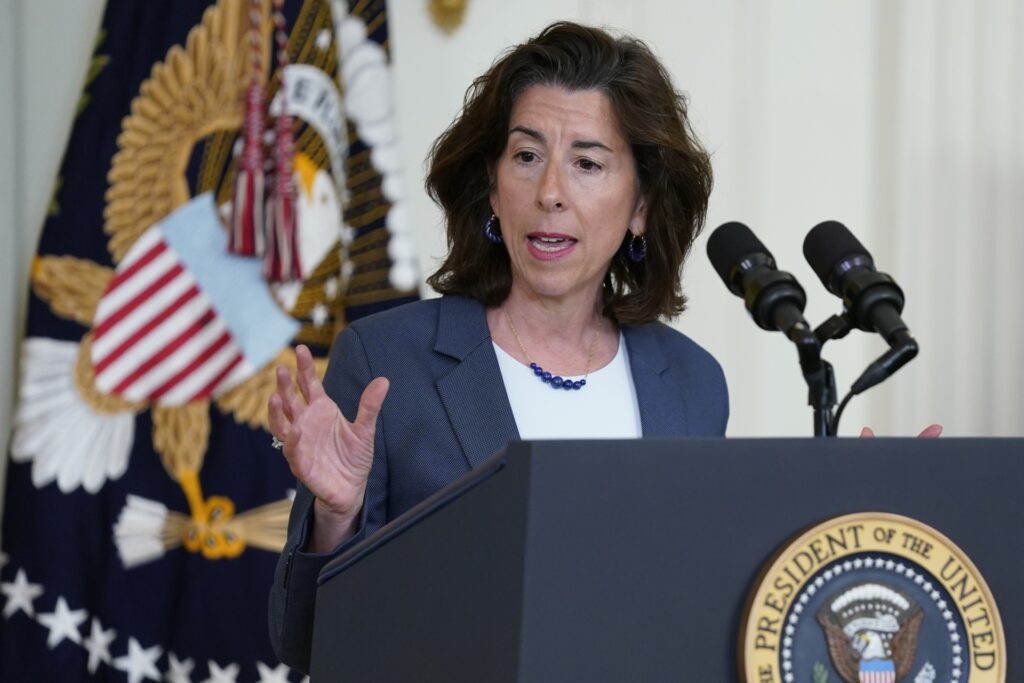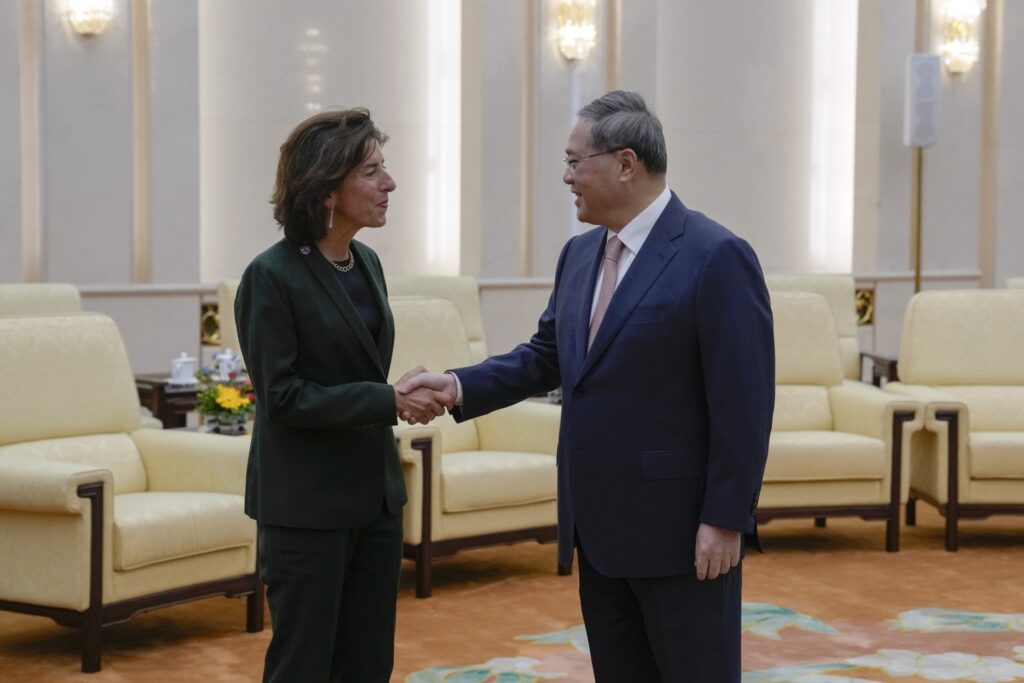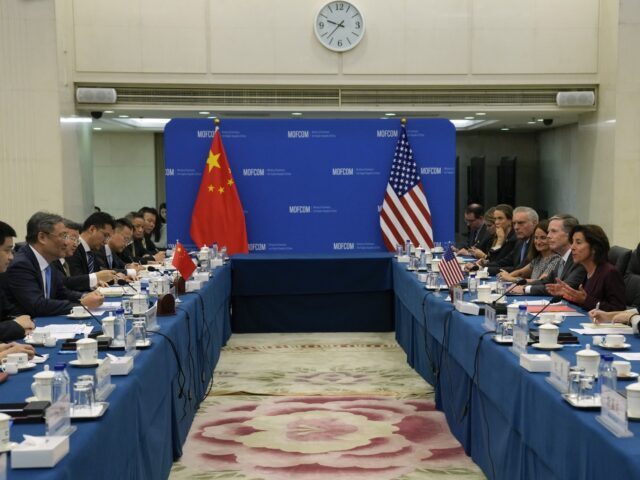U.S. Commerce Secretary Gina Raimondo visited Beijing on Tuesday and met with China’s Vice Premier He Lifeng.
The two spoke for nearly four and a half hours, seemingly without any major breakthroughs.
Chinese state-run Xinhua news service wrote an uninspired summary of the meeting that quoted He bloodlessly repeating China’s trade concerns and quoted nothing from Raimondo at all:
The two sides had candid, pragmatic and constructive discussions over implementing the important consensus reached at the Bali meeting between the two countries’ heads of state, as well as economic and trade issues of common concern.
The Chinese side expressed its concerns over measures taken by the United States, such as Section 301 tariffs, export controls against China and two-way investment restrictions.
The two sides agreed to continue to maintain communication and support enterprises of the two countries in carrying out pragmatic cooperation.
The November 2022 meeting in Bali between President Joe Biden and Chinese dictator Xi Jinping was not much of a news-maker either. Biden complained about North Korea’s provocations, Xi asserted China’s right to control Taiwan, and both of them tentatively agreed that Russia was going too far by threatening to use nuclear weapons in Ukraine. The most important economic news from that meeting on the sidelines of the G20 summit was that Biden promised the U.S. did not want to start a “new Cold War” or “decouple” from China.
Raimondo on Tuesday repeated the pledge that the U.S. does not want to sever economic ties with China, but she added criticism that Xi’s heavy-handed regulations are making China hostile to foreign investment.
“Increasingly, I hear from businesses China is uninvestible because it has become too risky,” she said.

Commerce Secretary Gina Raimondo in the East Room of the White House on June 26, 2023, in Washington. (AP Photo/Evan Vucci, File)
Raimondo told reporters she passed along concerns from American businesses with operations in China, such as intellectual property theft, China’s heavy-handed new “counter-espionage” laws, Chinese police raids on foreign businesses, and Beijing’s recent habit of slapping huge fines on foreign companies without warning or due process.
In one such case last week, China fined U.S. due diligence firm The Mintz Group $1.5 million for allegedly conducting “unapproved statistical work” from 2019 through 2022. The fine was portrayed as China confiscating “illegal proceeds” from the firm, which insisted it has always operated lawfully.
The Mintz Group was also the target of one of the police raids Raimondo complained to He about. The firm’s office in Beijing was raided in March 2023 without explanation, and five of the Chinese nationals who worked for the company were arrested. Outside observers speculated Mintz angered the Chinese Communist Party by digging too deeply into the party’s heavily falsified economic reports.
The counter-espionage law Raimondo mentioned was passed in April 2023. Critics said it asserted tighter state control over “documents, data, materials, and items related to national security and interests,” without clearly defining what those national security interests were. Foreign businesses are worried the law could be invoked to justify China prying into their confidential information and proprietary data.
“I was very firm in our expectations. I think I was heard. We’ll have to see if they take any action,” Raimondo said, admitting that He did not commit to any such actions during their meeting.
The commerce secretary said she refused Chinese requests to scale back export controls on advanced technology, including President Joe Biden’s August 9 executive order limiting U.S. investments in China for certain forms of advanced technology, including artificial intelligence.
“While we will never of course compromise in protecting our national security, I want to be clear that we do not seek to decouple or to hold China’s economy back,” she said.
“President Biden asked me to come here to convey the message that we do not seek to decouple. We seek to maintain our $700 billion dollar commercial relationship with China,” she repeated in her meeting with Chinese Premier Li Qiang.
“Economic and trade relations are the ballast for sino-US relations. A well-maintained economic and trade relationship is beneficial to both countries and the whole world,” Li responded.

U.S. Commerce Secretary Gina Raimondo is greeted by Chinese Premier Li Qiang at the Great Hall of the People in Beijing, Tuesday, Aug. 29, 2023. (AP Photo/Andy Wong, Pool)
Buchalter law partner John Ramig told Reuters on Tuesday that Raimondo’s comments about China becoming “uninvestible” were entirely accurate.
“I don’t have one client wanting to invest in China. Not a single client. Everyone is looking to either sell their Chinese operation, or if they’re sourcing products in China, they’re looking for an alternative place to do that. That’s dramatically different from what it was even five years ago,” Ramig said.
Voice of America News (VOA) noted the commerce secretary arrived in Beijing as the Chinese economy faltered and its stock market looked to be heading for a meltdown:
After opening more than 5% higher Monday than it had been at the end of trading the previous week, an index that tracks the share prices of 300 of the country’s largest companies lost most of those gains before the end of the day. It closed up just 1.2% at the end of the day.
The CDI 300 index is down nearly 7% since the beginning of August, part of a long-term decline that has seen the index lose more than 35% of its value since early 2021.
[…]
Beijing’s plans to boost the sagging stock market came while officials had to acknowledge that profits in China’s industrial sector continued to decline in July, falling 6.7% from a year earlier after an 8.3% drop in June.
VOA quoted analysts who said China’s efforts to deal with the economic slowdown mimic steps taken during an economic crisis in 2015, and they did not work then. In fact, some of the policies imposed by Beijing may have permanently damaged the Chinese equity markets by distorting prices and creating an immense “moral hazard” — in essence, the naive faith among small Chinese investors that they can never lose big money on the stock market because the authoritarian government would not allow that to happen.
VOA’s analysts said the Chinese government seems to be underestimating the lingering apprehension among foreign investors that coronavirus lockdowns and corporate crackdowns could happen again, the real-estate sector could implode and bring down the Chinese economy at any moment, and soaring unemployment rates are destroying China’s long-standing advantage as a supplier of cheap labor.
“What’s really key is not just to get words from Beijing, but actions to show that they’re willing to support private enterprises, which they really need for both domestic innovation productivity growth and in addition, employment growth,” Cornell University professor of trade policy Eswar Prasad said.
“But they need to send that message in a way that it really resonates with the private sector. So far, we’ve seen words. No real actions,” Prasad added.

COMMENTS
Please let us know if you're having issues with commenting.